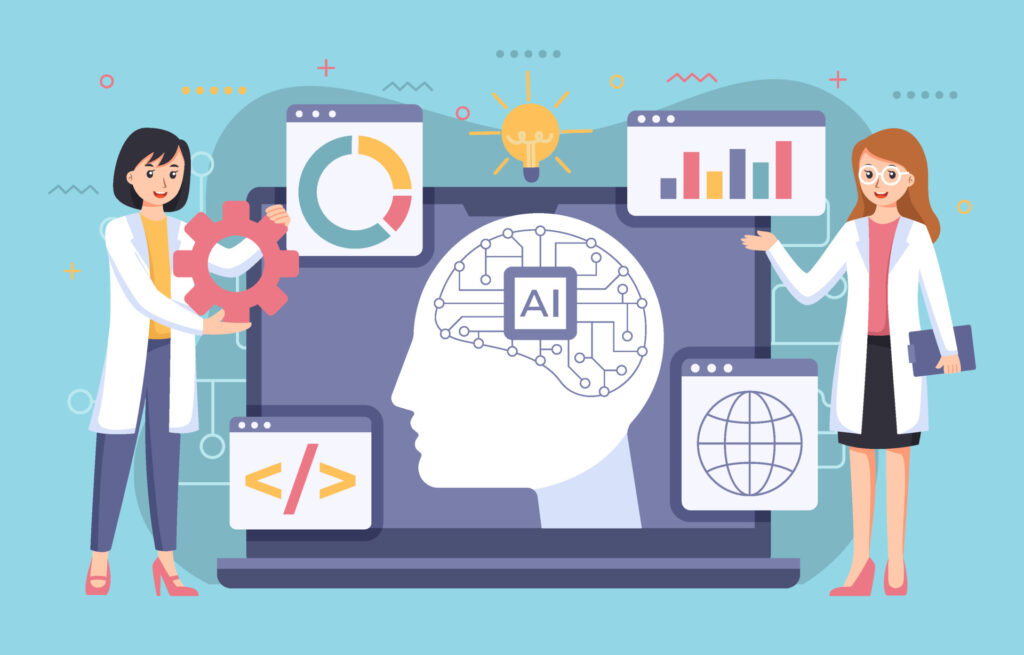Introduction
In the era of digital transformation, Artificial Intelligence (AI) emerges as a monumental force dynamically reshaping industries and societies globally. This comprehensive article actively explores AI’s pivotal role in the ever-evolving global digital landscape. It delves deep into the intricate nuances of AI’s transformative prowess, dissecting its impact across key sectors and conscientiously addressing the ethical considerations accompanying its pervasive adoption.
Standing on the precipice of a technological revolution, AI’s influence is palpable, not merely augmenting but fundamentally redefining how we conduct business, deliver healthcare, manage finances, and propel industries into uncharted territories of innovation. This examination goes beyond the surface, actively unraveling the layers of AI’s transformative power to expose the intricate interplay between technology, ethics, and the societal fabric.
In the subsequent sections, we will actively navigate through the profound implications of AI on industries such as healthcare, finance, and manufacturing, uncovering real-world applications that actively underscore its transformative capabilities. Simultaneously, the discourse will actively shine a spotlight on the ethical considerations demanding careful contemplation as we actively navigate the uncharted waters of AI integration into the fabric of our daily lives.
Overview of AI in Global Digital Transformation
Artificial Intelligence (AI) stands as the linchpin in the ongoing journey of digital transformation, wielding unparalleled capabilities to analyze vast datasets, derive insightful conclusions, and drive data-driven decisions. Its transformative impact extends across diverse industries, ushering in increased efficiency, fostering innovation, and elevating customer experiences to unprecedented levels.
In the contemporary landscape, AI is not merely a tool but a driving force behind the global digital transformation wave. The evolution of AI is marked by its ability to process and analyze massive datasets swiftly, allowing businesses and industries to make informed decisions. Machine learning, a subset of AI, empowers systems to learn and adapt without explicit programming, unlocking new possibilities for automation and optimization.
Moreover, AI’s impact on customer experiences is profound. Through advanced algorithms and predictive analytics, businesses can tailor their offerings, services, and interactions to individual preferences. This level of personalization not only enhances customer satisfaction but also contributes to the establishment of brand loyalty in an increasingly competitive market.
Transformative Power of AI in Key Industries
Healthcare Revolution
AI’s influence on healthcare is nothing short of revolutionary, with its transformative power evident in the deployment of diagnostic algorithms that meticulously analyze medical images. This application accelerates the diagnostic process, ensuring quicker and more accurate diagnoses. Beyond diagnostics, AI contributes to personalized treatment plans, optimizing patient care in ways previously unattainable.
Highlighting AI’s significance, success stories such as the collaboration between IBM Watson Health and Memorial Sloan Kettering Cancer Center showcase its pivotal role in identifying personalized cancer treatment options. The healthcare landscape is witnessing a paradigm shift, where AI has become an indispensable ally in providing tailored medical solutions.
In addition to diagnostics, AI is instrumental in drug discovery, genomics research, and the optimization of clinical trials. The ability of AI to analyze vast datasets quickly expedites the identification of potential drug candidates and accelerates the overall drug development process. This not only reduces costs but also holds the potential to bring life-saving treatments to patients more swiftly.
Financial Evolution
The financial sector is currently undergoing a profound evolution fueled by AI-driven innovation. Its applications range from fortifying defenses against fraud and assessing risks to engaging in algorithmic trading. Notably, AI doesn’t merely enhance efficiency; it fundamentally alters how financial institutions operate. The automation of processes, integration of data-driven insights, and heightened accuracy collectively redefine the financial landscape, marking a transformative journey where AI becomes an integral part of financial decision-making. This, in turn, revolutionizes operations and opens new avenues for innovation.
In the financial realm, robo-advisors powered by AI algorithms play a pivotal role, providing personalized investment advice based on individual risk profiles and financial goals. This not only democratizes access to financial advice but also optimizes investment strategies. Moreover, AI is actively reshaping customer service in banking, where chatbots and virtual assistants step in to provide real-time support. This dynamic enhances user experiences by streamlining routine inquiries and contributes to the ongoing transformation within the financial industry.
Manufacturing Efficiency
In manufacturing, AI assumes a pivotal role, notably in predictive maintenance, optimizing machinery performance, and minimizing downtime. Moreover, the integration of automation and AI-driven robotics transcends mere efficiency gains; it actively fosters adaptability in the face of evolving market demands. As a result, AI transforms manufacturing into a realm of streamlined operations where efficiency seamlessly meets agility. The impact is not confined to operational optimization alone; it signifies a transformative shift in how industries approach production, embracing technology as a cornerstone for efficiency and adaptability.
AI’s influential role in manufacturing extends to crucial aspects such as quality control, supply chain management, and demand forecasting. Utilizing computer vision systems powered by AI, defects can be inspected and identified in real time, thereby reducing errors and enhancing overall product quality. Additionally, the predictive capabilities of AI in supply chain management effectively optimize inventory levels, ensuring that resources are utilized efficiently. This holistic integration of AI in manufacturing goes beyond traditional practices, paving the way for a more responsive and agile industry.
In the financial realm, robo-advisors, empowered by AI algorithms, play a pivotal role, providing personalized investment advice based on individual risk profiles and financial goals. This not only democratizes access to financial advice but also optimizes investment strategies. Furthermore, AI is actively reshaping customer service in banking, with chatbots and virtual assistants stepping in to provide real-time support. This dynamic not only enhances user experiences by streamlining routine inquiries but also contributes significantly to the ongoing transformation within the financial industry.

Ethical Considerations and Challenges
Bias and Fairness
The ethical landscape of AI is intricately tied to the challenge of bias and fairness. AI systems, when trained on historical data, inherit the biases present in that data, leading to potential inequities and discriminatory outcomes. Recognizing and mitigating these biases are critical imperatives for ethical AI deployment. This involves not only identifying biased patterns in training data but also implementing measures to counteract and rectify them. Ethical AI frameworks strive for fairness by ensuring that algorithms provide equitable results across diverse demographic groups. Researchers and developers play a crucial role in crafting algorithms that are not only accurate but also unbiased, promoting a future where AI contributes to a fair and inclusive society.
Transparency and Accountability
The opacity of AI decision-making processes raises ethical concerns, especially when these decisions impact individuals and communities. Transparency is fundamental to building trust among users and stakeholders. Ethical AI deployment involves establishing accountability frameworks and adopting transparent AI models. Users should have a clear understanding of how AI algorithms arrive at decisions, particularly in sensitive areas like finance, healthcare, and criminal justice. Transparent AI models enable scrutiny and evaluation, fostering accountability and ensuring that decisions align with ethical standards. By prioritizing transparency, the ethical use of AI becomes a shared responsibility, involving not only developers and organizations but also the broader community affected by these technologies.
Job Displacement and Workforce Impact
The advent of widespread AI adoption brings forth legitimate concerns about potential job displacement and its impact on the workforce. Ethical navigation of this challenge necessitates proactive measures for upskilling and reskilling. Rather than viewing AI as a threat to employment, ethical considerations underscore the importance of viewing it as an opportunity for workforce transformation. Organizations, policymakers, and educational institutions must collaborate to design comprehensive upskilling programs that equip workers with the skills required in the evolving job market. Ethical approaches to job displacement involve not just mitigating negative impacts but actively fostering a culture of continuous learning, ensuring that the workforce remains agile and adaptable in the face of technological advancements.
Privacy Concerns
The AI use often entails processing large amounts of personal data, raising significant privacy concerns. Ethical AI frameworks prioritize user privacy by incorporating robust data protection measures. This involves implementing encryption, anonymization, and secure data storage practices to safeguard sensitive information. Users have the right to understand how AI systems collect, process, and utilize their data. Transparency in data practices, coupled with user consent mechanisms, forms the bedrock of ethical AI deployment. Prioritizing privacy aligns ethical AI frameworks with legal and ethical standards, creating an environment where individuals can trust that AI systems handle their data responsibly and ethically. Privacy-centric AI design ensures that the benefits of AI innovation do not come at the expense of individual privacy rights.
Conclusion
In conclusion, AI’s transformative power actively highlights the inextricable link between technological progress and ethical obligations on the global stage of digital transformation. Moreover, the integration of AI into our digital landscape actively brings forth not only a myriad of opportunities and challenges but also necessitates a comprehensive and concerted effort to actively chart a course that upholds ethical considerations.
To successfully navigate these frontiers, there must be an active unified commitment to confronting challenges proactively. This involves actively acknowledging the potential risks associated with AI deployment and actively prioritizing ethical frameworks to mitigate these risks effectively. This united front is crucial for actively establishing a resilient foundation that ensures the responsible development and implementation of AI technologies.
As we stand at the threshold of an era where artificial intelligence converges with humanity, the pillars of understanding, transparency, and responsible deployment actively emerge not only as guiding principles but as indispensable cornerstones. Understanding the intricacies of AI technologies and their potential impact on society is the first step toward actively responsible integration. Simultaneously, transparency in the development and application of AI is equally vital, actively fostering trust and accountability among stakeholders.
Furthermore, active responsible deployment implies a commitment to actively designing and using AI in a manner that aligns with ethical standards. This encompasses active considerations such as fairness, accountability, and the avoidance of bias in AI algorithms. The ethical deployment of AI technologies is essential for actively creating a future where the benefits of AI are maximized, and potential risks are actively mitigated.
Ethical Principles for a Human-Centric AI Future
In shaping Ethical Principles for a Human-Centric AI Future, the significance of these principles cannot be overstated. They collectively shape a future wherein AI evolves beyond mere enhancement to genuinely augment human capabilities. This augmentation extends beyond technological advancements, encompassing ethical dimensions that prioritize the well-being and interests of humanity. By upholding the pillars of understanding, transparency, and responsible deployment, we pave the way for a harmonious coexistence between AI and humanity, ensuring that the transformative power of AI contributes positively to the betterment of our global society.
FAQs: (Frequently Asked Questions)
Q1: How is AI contributing to the healthcare sector?
A1: AI is revolutionizing healthcare through diagnostic algorithms, personalized treatment plans, and collaborations that enhance the efficiency of medical processes.
Q2: What ethical challenges are associated with AI adoption?
A2: Ethical challenges include biases in AI algorithms, lack of transparency, concerns about job displacement, and privacy issues related to the processing of personal data.
Q3: Can AI be ethically deployed in the financial sector?
A3: Yes, ethical deployment involves ensuring fairness, transparency, and accountability in AI-driven processes within the financial sector.
Q4: How can businesses ensure the ethical use of AI in decision-making processes?
A4: Businesses can ensure ethical AI use by implementing transparent algorithms, conducting regular audits, and prioritizing fairness and accountability in their AI systems.
Q5: What steps can be taken to mitigate job displacement concerns associated with widespread AI adoption?
A5: Mitigating job displacement concerns involves investing in workforce training and reskilling programs, fostering a culture of continuous learning, and implementing policies that promote a smooth transition for employees affected by automation.















One Response